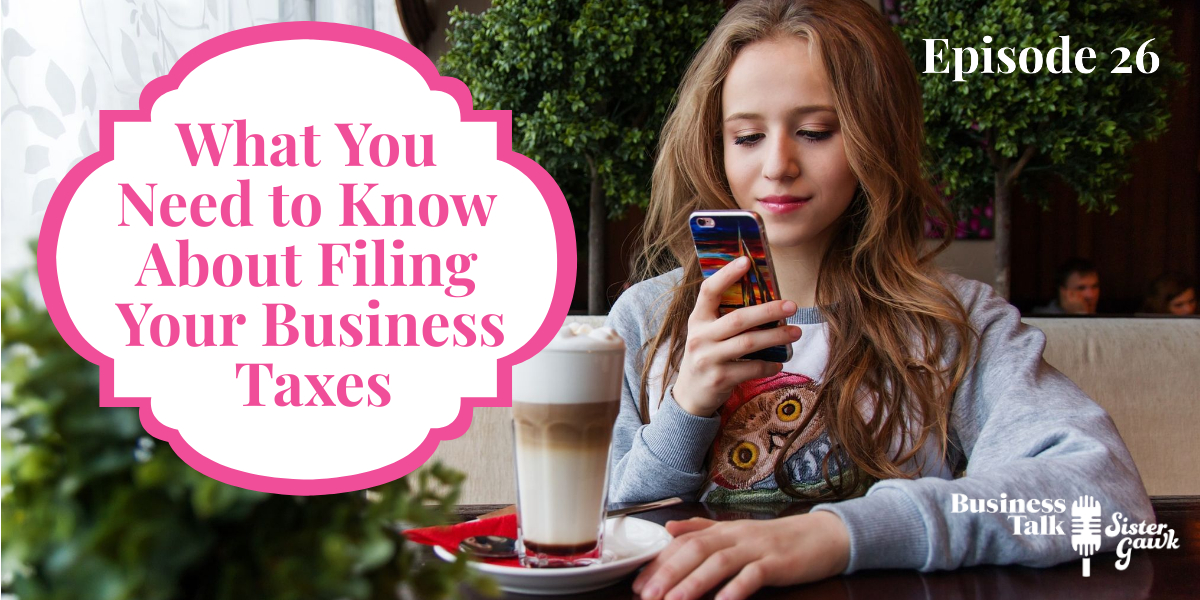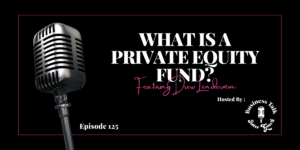In this episode, Bekkah gets really excited to tell you all about getting ready to file your taxes. The best news? You only pay taxes when you make money! So, you’re never just paying them for nothing. Stick around for some tips to help you prepare!
Liability disclaimer: all our tips are from personal experience and are not considered legal or approved tax advice.
Welcome to Business Talk Sister Gawk! I’m Bekkah! And I’m Ruthie!
Bekkah: And today we are going to get you awake and alive because we are going to be talking about business taxes!
Ruthie: Ooo! Look at that spicy content. Let’s go!
Bekkah: In one of our most recent episodes we were recording. All of a sudden we just turned into like these weird jazz chill voices. We’re going to put you to sleep. We thought, well, we’re going to try to make up for that in this episode but the reality is that we’re talking about taxes. So here we go! Okay.
What forms should I have as a small business to do my taxes?
Ruthie: It depends on what your business model is and if you are a sole proprietorship or not. Bekkah is going to tell us about that.
Bekkah: The very first thing that I hear a lot from people is, “Oh I don’t want to start a business because I don’t know how to do taxes!” The good news is you don’t have to pay any taxes if you don’t make any money.
Ruthie: Wow!
Bekkah: So it’s really not scary because you’re only putting aside a portion of what you made to pay for the income that you’ve generated. It’s not like you’re going to have to pay anything when you didn’t make any money. You’ll always have the money to pay your taxes if you make sure to save it. What does that look like? If you are a sole proprietor, you’re just working and people are paying you for doing something. You haven’t set up a business whatever maybe you’re just a subcontractor for somebody. If you make more than $600 in one year from one person that is paying you you need to report that on your income taxes. Surprise!
If you’re making more than six hundred dollars, you should make sure that you are giving that person, especially if their business, you should be reporting it if they’re just a person like an individual say you’re doing a bunch of yard work or whatever.
What is a W-9 Form?
If you’re doing it for a business you should make sure to give them something called a W-9. A w-9 is this lovely form you can search it on the internet, we will actually link to it in the blog post. It’s on the federal IRS website and has information basically about your name, your address, and it’ll ask you either for your social security number or your EIN.
What is an EIN Number?
Your EIN is a number that you get if you file a legal business name. That will basically be within your business structure so and if you’re not a sole proprietor you would have an EIN number when you register your business or your company with the government. We should talk a little bit about the difference between the federal registration with the government for your business and then there’s also the state. That’s your name and stuff you register with the state but then you also get a federal number through that process. Let me tell you if you ever have questions just call the IRS! Actually! No, seriously. You can call! Or the secretary of state and say, “Hey, I’m filing this what does that look like?” And they’ll try to point you to different places on the website. There are tons of information there already.
Let’s talk a little bit more about let’s say you make over $600. What does that look like? You’ve maybe submitted your w-9 to the business that you’ve been working for as a subcontractor or as in providing an overall service or a product. How do you report that at the end of the year? You use a form that they give you called a 1099. They’re going to start doing their taxes and they say, “Here you go. Here’s a form that you use to report your income.” If they don’t give you that form you should still report it anyway. You just won’t have the numbers for where this income came from. Keeping track of your income is something you can do with accounting software.
Ruthie: Dun dun deeeh!
Bekkah: I don’t even need a little soundtrack things because Ruthie just comes up with them on the spot.
Ruthie: I come with them built in. It’s my speciality.
Bekkah: Yeah, you know how some radio shows they always have all these little sound effects like Boing!
Ruthie: Buttons that they push. I do that in regular life. I just make my own sound effects on accident. They just come out. They’re involuntary.
When Should I Be Paying In for My Business Taxes?
Bekkah: Involuntary free sound effects. Okay, where were we? When you report stuff using your accounting system, let’s go back a little bit to talk about whether you should be filing your taxes quarterly or annually. Big question. Technically, you should be filing them quarterly, but if you’re not making more than I think the threshold which you’ll have to look up it’s been somewhere between like $15 to $20,000. (NOTE: Bekkah wanted to clarify that you should be reporting your estimated taxes quarterly as you are reviewing your income in order to properly file your taxes to make sure you are paying in the right amounts. You don’t want to pay any penalty fees! Otherwise you will have a huge tax bill at the end of the year.)
Ruthie: I think it’s important to note at this point that neither of us are experts on this. We just have varying levels of experience Bekkah has more experience with business taxes than I do. I have more experience with like people’s for personal finance on a day-to-day basis. Bekkah has more experience with personal finances as well as business finances but you really should do a lot of research on your own and not just take everything that we say for granted. Which you should do that anyway, but just take everything we say with a grain of salt even though we have done a lot of research and we have a decent amount of experience with it.
Bekkah: #Don’tSueUs. We’re not certified public accountants. We just know stuff that we Google on the internet. No, actually, and we’ve had lots of conversations or done it for personal business use or whatever. Okay, anyway. The threshold okay I said 10 to 15 it probably is 150. I actually don’t know, so you should probably look that up, but you can file annually if it’s a sole proprietor because you’re doing it on your regular income tax. Because it’s straight through. The money’s going straight through to you not as a business pass-through. It’s not going to your business and then to your personal bank account, but regardless if it’s a business or not that is a legitimate filed structure you should have a separate bank account for your business so that you can track your costs of goods sold better. Because when you track your cost of goods and your mileage that you have for going to different places for your business or whatever those are called tax write-offs.
Ruthie: Ta-dah! I was going to say Den-Den again and then I thought I should switch it up.
Bekkah: Oh okay. Your job is to think about your next sound effect to make it unique before the next one.
Ruthie: All right.
Are There Business Expenses I Can Write Off On My Taxes?
Bekkah: Okay so tax write-offs those are super important to think about because when you run a business there’s lots of things you can write off for different reasons. If you purchase equipment that’s a tax write-off you can report and say, “Yep I actually took money from the money that I made and I used it to buy new things.” In the end when you look at your financial statements which in the future we’ll be talking about how to read financial statements and all that kind of fun stuff, that is your net. At the top is your gross income if you’re reading a financial statement and then below that is all the things that it cost me to run my business and then below that after all of the expenses and everything you will see the net income.
What did you actually make after you paid for your gas, after you had to buy equipment, all that kind of stuff? When you do a whole lot of driving and all that kind of stuff those things can be tax write-offs but you need to track them. When you track them you can either use a spreadsheet. You can use a notebook in your car. Or you can check out I really like the app for quickbooks self-employed. It actually has a little tracking of your location to report whether that was a trip you made for work. That actually syncs really nicely with turbotax and all that. I am personally not a fan of paying money for things, so I just do it on my own on a spreadsheet.
Ruthie: Also if you are looking at the past and you’re like, “Man, I really should have been keeping track of this. If you are as immersed in Google as I, unfortunately, am you can actually look at your trips and stuff on Google maps and it can show you that data. I think it goes back I don’t even know how long maybe indefinitely. That’s a lie you would not have it indefinitely but it goes back a decent amount of time and you can actually look at the different trips and it’ll show you on this day you went from this place to this place and then from this address to this address. Then you can calculate the mileage that way if you have to go back, but that’s a lot of work.
Bekkah: That’s also if you have your location tracking on at all times.
Ruthie: Which I do because I actually think it’s really fun.
Bekkah: Which I would not recommend!
Ruthie: I think it’s really cool, so keep that in mind.
Bekkah: Personal preference. What are you giving up? What are you giving up in terms of privacy? If you keep it in a notebook in your car nobody knows where you’ve been.
Ruthie: Yeah, hopefully, Google is not tracking that.
How Long Does It Take to File Your Business Taxes?
Bekkah: Because that would be weird if they did. The next question we have is how long does it take to do my taxes for a small business? Are you asking me that question?
Ruthie: Yeah. How long does it take to file your business taxes?
Bekkah: Okay. It really depends on your business structure. There are so many different business structures. If you are doing it under your pass-through sole proprietor or partnership which is pretty similar to sole proprietor except you’re doing it with somebody else and you’re just passing that money’s right through to you guys.
There are a lot of things about business structure we can talk about here, but if it’s like a s-corp or corporation you have shares in the company and you’re reporting those a little bit differently. But if you use a tax software or if you’re working with an accountant, they’re going to walk you through those categories. How long does it take? It really is dependent on if all of your stuff is together.
Are you organized? Because if you have all of your receipts, which, by the way, I love receipts by Wave. It’s an app on your phone, you take a picture, it logs it in your accounting system, you can do your reconciliation later. Then you don’t have to save all the paper copies. If you like saving paper copies and you really like having extra security you have all those in a file and you add those up and say, “Yep this is how much I spent on the business this year.” I would organize them by year so if we talk about fiscal year it’s a big word, but different companies have different filing fiscal years. Some companies like big corporate companies it’s weird, but they have their filing in August. Whereas, everyone else files at the beginning of the year for the previous year. Those taxes like for personal taxes are due by like April 15th.
Are All Tax Write-Offs Good For Your Business?
How To Pay Taxes on Products vs. Services
What Is Use Tax?
What Is the Difference Between Sales Tax and Income Tax?
If you enjoyed this episode, subscribe to our podcast on Spotify for more great content!




